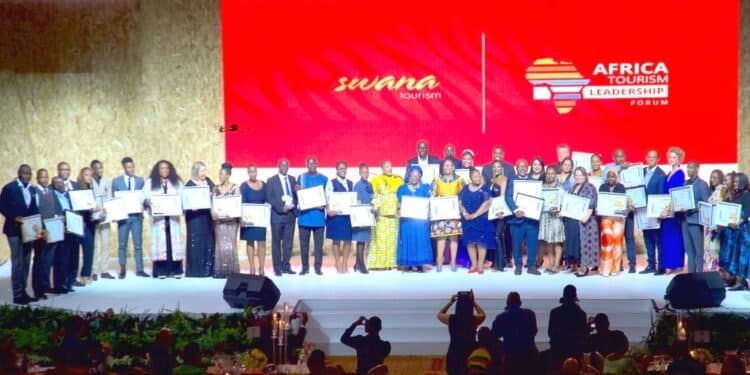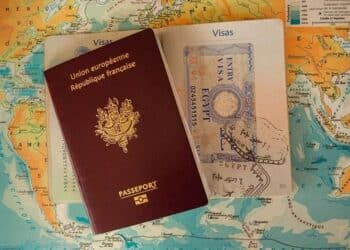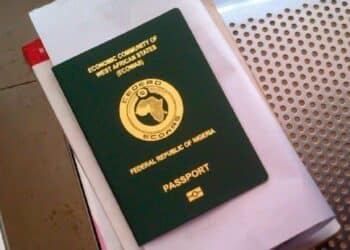The much-anticipated sixth edition of the Africa Tourism Leadership Forum and Award, held between October 4th and 6th, 2023, at the Gaborone International Conference Centre (GICC) in Botswana, has undoubtedly phenomenally advocated for Africa as a single tourism destination.
The 2023 ATLF, which included over 600 delegates from public and private tourism in over 40 African countries and had the theme “Shifting demand dynamics to shape the future of intra-Africa Travel,” called for a borderless Africa, seamless intra-Africa travels and exchanges, and collaborative initiatives in the tourism industry to align the African tourism industry with its global peers.
This year’s edition of the historic forum, held in Botswana for the second time out of the three-year hosting right granted by the organisers, the African Tourism Partners, discussed more industry-focused issues and solutions. It also witnessed more collaborations with the African Continental Free Trade Area (AfCFTA), the University of South Africa (UNISA) and the Botswana government. The earlier editions of the forum were held in Ghana, South Africa and Rwanda.
Vice-President of the Republic of Botswana, Hon Slumber Tsogwane, has cautioned against over-commercialising African cultural heritage products. He noted, “This can lead to the erosion of authenticity in the quest for a quick profit.”
Hon Tsogwane disclosed this during his speech at the 6th Africa Tourism Leadership Forum and Award (ATLF) ‘s official opening on Wednesday at the Gaborone International Conference Centre in Gaborone, Botswana. The forum theme was “Shifting demand dynamics to shape the future of intra-Africa Travel. ”
Opening Ceremony and Remarks
Vice-President of the Republic of Botswana, Hon Slumber Tsogwane, cautioned against over-commercialising African cultural heritage products. He noted, “This can lead to the erosion of authenticity in the quest for a quick profit.”
His words: “In as much as African cultural heritage products are a huge sell at international markets, one needs to caution against their over-commercialisation. This can lead to the erosion of authenticity in the quest for quick profit. We have to ensure that our indigenous cultures are protected and preserved. Therefore, we, the African states, need to enact laws and policies geared towards protecting, conserving and preserving our cultural heritage for the sole benefit of our future generations.”
Additionally, Hon Tsogwane urged African tourism companies present at the meeting to collaborate to expand the industry, increase wealth and employment opportunities, and develop skills.
He continued by highlighting some of his nation’s achievements in promoting foreign direct investment, particularly from inside the continent, and promising investors that Botswana would continue to offer them more open doors.
On her part, Botswana’s Minister of Environment and Tourism, Ms Philda Mani Kereng, acknowledged the opportunity to incorporate innovative technological solutions to support industries and to embrace new ones such as digital tourism. She also emphasised the necessity of coordinating tourism-related industries to completely expand prospects for young people and industry stakeholders, particularly in the SME sector.
Kwakye Donkor, CEO of Africa Tourism Partners in South Africa, described the 2023 edition of the Africa Tourism Leadership Forum and Awards as an evolution of the six-year-old intra-travel and tourism thought-leadership dialogue series. The Forum is a flagship Pan-African public-private tourism platform curated to shape the future and optimally position travel, tourism, and hospitality among Africans while shifting demand dynamics.
According to Donkor, the 2023 and 6th editions of the ATLF are an evolution of the six-year-old intra-travel and tourism thought-leadership dialogue series.
He was thrilled that the AfCFTA Forum on Tourism, Creative Arts and Culture, was a boom for the industry considering the fruitful dialogues, insights, and call to action at the forum, and that the forum lived up to its objectives of shaping the future and optimally positioning travel, tourism, and hospitality among Africans while shifting demand dynamics.
In his statement, the Secretary General of the UNWTO, Zurab Pololikashvili, who participated virtually, praised the ATP for developing a platform that alters the African tourism industry.
He was intrigued by the fact that ATLF continues to expand in all directions with each edition, strengthening already-established enterprises and identifying and developing new entrepreneurs.
The vice president and his entourage toured the exhibition booths at the forum shortly after its official opening. There, they spoke with and interacted with exhibitors from all over Africa.
The electrifying presentations of the KTM Choir, the Nca’nca ase traditional troupe, and music artists from Botswana were the highlight of the official opening of the 2023 ATLF.

AfCFTA Inauguration
The African Continental Free Trade Area (AfCFTA) Summit on Tourism, Creative Industries, and Cultural Industries was launched at the summit as the Africa Tourism Partners (ATP) promised.
The first day was devoted to the AfCFTA’s influence on boosting tourism through culture and the creative industries, with the official announcement of the AfCFTA cooperation with ATLF.
Five sessions examined the AfCFTA Secretariat’s strategy for maximising potential in the tourism, cultural, and creative industries while supporting Africa’s development goal.
Intra-Africa Travel B2B Sessions
The forum began with a bustling day of networking and training at the GICC under the title “Transformational Entrepreneurship and Intra-Africa Business to Business Networking Sessions,” which served as a lead-in to the main event, which included insightful talks from leading business figures.
Some specialists included Wambugu Wa Gichohi, a franchise consultant who explained the nuances of franchising in the tourism industry, and Hamza Farooqui, CEO and founder of Millat Investments, who provided insights into tourism entrepreneurship.
Women in Tourism Entrepreneurship also enlivened the event with their presentation from the University of South Africa (UNISA) on sustainable tourism enterprises from the agritourism initiative.
During the forum, Emily Mburu-Ndoria, Director of the Directorate of Trade in Services, Investment, Intellectual Property Rights and Digital Trade (DTIID) at the AfCFTA Secretariat, hosted incisive conversations and thought-provoking talks on the future of African tourism.
All Africans made demands for marketing the brand Africa, collaborating to scale cultural events into tourist destinations, and supporting national policies from each African nation.
Emily Mburu-Ndoria stressed that the continent needs to streamline trade regulations to improve advocacy, marketing, and investment in tourism and market its brand more effectively.
Patricia de Lille, South Africa’s Minister of Tourism, emphasised the importance of authentically promoting “Brand Africa” and quickening the sector’s revival.
Speaking from the government’s perspective, she said that African countries must encourage the private sector and establish a forum for communication between them.
The panellists’ conclusion emphasised the necessity of Public-Private Partnerships (PPP) to expand and improve Africa’s tourist sector.
They also urged the AfCFTA to release action plans that would hasten the plans’ execution while putting young people and women at the centre of forward-thinking tourism activities and policies.
Another important subject of debate was how to package various cultural events to promote tourism.
The panellists urged cooperation and a change in operating models to lower the cost of regional flights, which they saw as solutions to the continent’s weak air connectivity.
To avoid paying needless taxes, the AfCFTA at the meeting deemed regional flights to be domestic.
Despite supporting AfCFTA’s classification of domestic flights inside Africa as such, Susan Akporiaye, head of the National Association of Nigerian Travel Agencies (NANTA), urged the African Union organisation to move beyond words and work with governments and airlines to take concrete steps that will result in lower ticket prices.
She urged other African nations to follow Rwanda’s example, which opened its borders to all Africans and does not require a visa to enter.
The panel on “Optimising Returns on Tourism and Hospitality Investment” provided attendees with tips on operating profitable tourist businesses and information on securing private and development financing for their projects. In addition to the PPP paradigm, the panel suggested equity models and crowdsourcing.
Leading figures in Africa’s tourist and hospitality industries have emphasised the need for long-term intra-African business partnerships and networking platforms to expand opportunities, foster competition among participants, and accelerate sector growth.
For the continent’s tourist industry to fully realise its untapped potential and compete favourably with its international counterparts, it requires active exchanges, strategic partnerships, skill development, crowd-funding methods, and good corporate governance.
At the Forum’s trading and training sessions on the theme of “Transformational Entrepreneurship and Intra-Africa Business to Business Networking Sessions,” Hamza Farooqui, CEO/founder of Millat Investments, shared insightful information about sustainable tourism entrepreneurship models while admonishing African business owners to reconsider the idea of owning the majority shares in a small company rather than having a small s.
Farooqui gave the example of his company, which has debts for four Hyatt Hotel brand-managed hotels, and added, “We need to adopt investment models that are workable in the tourism industry, learn from thriving destinations and industries, and most importantly, network across the continent.”
Wambugu Wa Gichohi, a well-known Kenyan franchise consultant, discussed sustainable business models and the need for collaboration. He also stressed the complexities of franchising in the tourism sector and shared some successful models that have boosted hospitality entrepreneurship across the continent.
Barry Clemens, CEO of Hospitality EQ, who lives and works in East Africa, said during the event’s interactive session that African tourism companies should learn from the best corporate governance and management practices, particularly from Asia, where companies outlive their founders and develop from family to global businesses.
If we pool our resources at the continental level, share, and take care of one another, we can accomplish that in Africa and in the tourism industry, he said.
Lesedi Nduna, senior lecturer in the Department of Applied Management and Tourism at the University of South Africa, described how the university-backed initiative Women in Tourism Entrepreneurship has grown agritourism and assisted women in exploring opportunities within the larger tourism sector by using efficient business collaboration platforms.
She remarked that the grouping of like-minded women had successfully created jobs and riches by creating sustainable tourist enterprises that were sensitive to the requirements of their local communities and customers.
Cultural Night
The highlight of this year’s forum was the gala dinner, where awards were given out to deserving industry stakeholders and the winners of the African Youth in Tourism Innovation Challenge 2023. The cultural night, held at the Three Dikgosi Monument in Gaborone CBD, and a city tour of Gaborone generated more excitement for the delegates.
In expressing her excitement and that of her country over the forum’s success, the Botswana Minister of Environment and Tourism noted that Botswana is happy to welcome global tourists to her shores and that the ATLF has showcased the country to many in the world in the last two years the forum has been held. She also assured the delegates of a much bigger forum next year.
ATLF 2023 Award
The African Youth in Tourism Innovation Challenge winner that evening was Gloria Kisilu of The Shaba Kenya. The first runner-up went to Cornelius Ugwu of Nigeria, and the second went to his South African rival.
The Diaspora Affairs Office of the President of Ghana received the Leading in Progress Policies Award at the ATLF 2023 Awards. Lizanne Du Plessis of Eco Africa Digital won the Outstanding Entrepreneurship Award, CNBC Africa won the Outstanding Africa Tourism Media & Marketing Award, and Lizanne Du Pleasis of South Africa won the Women in Leadership Award.
The African Wildlife Foundation received the Championing Sustainability Award. Kenya won the Most Innovative Business Tourism Destination Award, followed by Cape Town, South Africa, and Four Seasons Resort Seychelles for Outstanding Accommodation Facility/Group.
Ethiopian Airlines received the Outstanding Tourism Transportation Award, and Botswana’s Minister of Environment and Tourism, Philda Nani Kereng, received the Destination Africa Lifetime Award.
Ernie Heath, a retired professor from South Africa, received the Special Recognition Africa Tourism Leadership Award, and Kinson Kgaga of the Botswana Guides Association and Mmankudu Glickman of the Bahurutshe Cultural Village each received the Botswana Minister’s Recognition Award.










